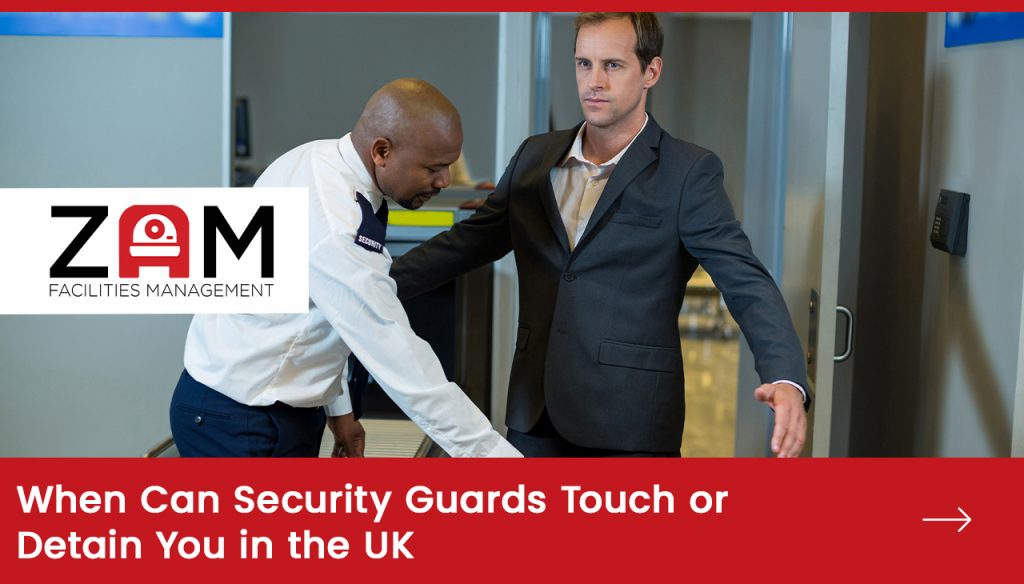Have you ever felt uncomfortable or intimidated by an overzealous security guard while going about your business? Perhaps you’ve witnessed a situation that seemed to cross the line, leaving you wondering about the legal boundaries for these private sector officers. Security officers play an important role in protecting property and maintaining order, but their powers are not unlimited. Understanding your rights is crucial to ensure you aren’t subject to unlawful detainment or excessive force.
In this comprehensive guide, we’ll demystify the complexities surrounding when security guards can legally touch, restrain or detain individuals in the United Kingdom. Arming yourself with this knowledge can empower you to confidently navigate encounters and assert your civil liberties when necessary.
Blog Outline
ToggleTouching a Person: Justifiable Circumstances
Security guards are not granted unlimited authority to touch or handle individuals as they please. The law permits them to make physical contact only when specific circumstances arise:
- Witnessing a Crime: If a security guard catches someone committing a crime, they can touch or restrain the individual until law enforcement arrives.
- Self-Defence: When an individual is physically involved in a fight to harm the guards or others, the guards can use reasonable force for self-defence.
- Property Damage: If a person is caught damaging property, security guards can touch or detain them to prevent further destruction.
- Holding for Police: When a crime has been committed, security guards can touch or hold an individual until the police arrive at the scene.
It’s crucial to note that security guards must explain their reasons for physical contact and justify their actions. They cannot arbitrarily touch or detain someone without a valid reason.
Detaining an Individual: Legal Grounds
In certain situations, security guards have the legal authority to detain individuals. This typically occurs when:
- They witness a crime or have substantial evidence, such as CCTV footage, of a person committing an offence.
- Detaining someone is necessary to prevent further offences from occurring.
However, it’s essential to understand that security guards cannot detain individuals based solely on allegations or suspicions. They must have solid evidence to support their actions.
Security officers are prepared to deal with the circumstance calmly and professionally during lawful detention. They must inform the detained person of the reason for their detention and maintain clear communication throughout the process. Any misconduct, disrespectful treatment, or excessive force can harm the guard’s reputation and career, possibly leading to legal consequences.
Rights of the Detained Individual
It’s essential to remember that individuals being detained by security guards also have rights. They can challenge the detention if they believe it is unjustified and potentially take legal action against the guard. Additionally, the individual must receive prompt medical assistance if physically harmed during the detention process.
Proper Training: A Necessity
Proper training is paramount to ensure that security guards operate within the boundaries of the law and uphold their responsibilities effectively. Our company, Hurak, connects aspiring security professionals with SIA (Security Industry Authority) approved training providers. These courses cover various aspects of security, including:
- Door Supervisor Course
- Security Guard Course
- Close Protection Course
- SIA Trainers Package
- CCTV Operator
Additionally, we offer an SIA mock test that simulates the actual exam-style questions, allowing individuals to practice and prepare thoroughly before taking the official assessment.
Conclusion
In conclusion, security guards in the UK have the legal authority to touch or detain individuals, but only under specific circumstances and with proper justification. Their actions must be proportionate and in compliance with applicable laws. By undergoing comprehensive training and adhering to best practices, security guards can effectively contribute to public safety while respecting individual rights and upholding the law.
Frequently Asked Questions (FAQs)
How long can a security guard legally detain someone?
There is no fixed duration for how long a security guard can detain someone. However, the general rule is that the detention should last only until the police arrive at the scene. Security guards cannot hold someone indefinitely without involving law enforcement authorities.
Can security guards use force when detaining someone?
Security guards are are allowed to utilize sensible power when detaining someone, but only as a last resort and in proportion to the situation. Excessive or unnecessary force is illegal and could lead to legal consequences for the guard.
Are security guards allowed to search individuals or their belongings?
With proper authorization, security guards can search individuals or their belongings under specific circumstances. However, without permission or reasonable suspicion, they do not have the automatic right to conduct searches.
Can security guards deny entry to the premises?
Yes, security guards have the authority to deny entry to individuals if they have a valid reason to do so, such as suspected criminal activity, disruptive behaviour, or potential threats to safety. However, they cannot discriminate against individuals based on protected characteristics like race, gender, or religion.
What should I do if I believe a security guard has acted unlawfully?
Suppose you believe that a security guard has acted unlawfully or violated your rights. In that case, you can file a complaint with the relevant authorities, such as the police or the Security Industry Authority (SIA). Think about looking for lawful guidance to investigate your choices for making a further move.
Contact Detail
For Security Contact Us!
- Number: +44 0161 791 5300
- Email: info@zamfm.co.uk
- Address: 1b First Floor, Bank House The Paddock, Handforth, Wilmslow, England, SK9 3HQ
